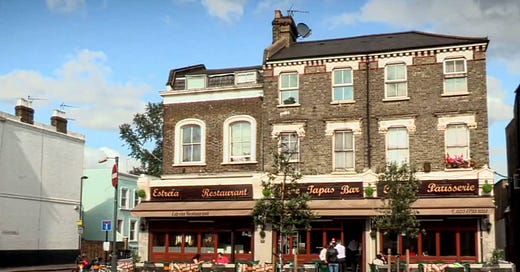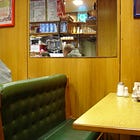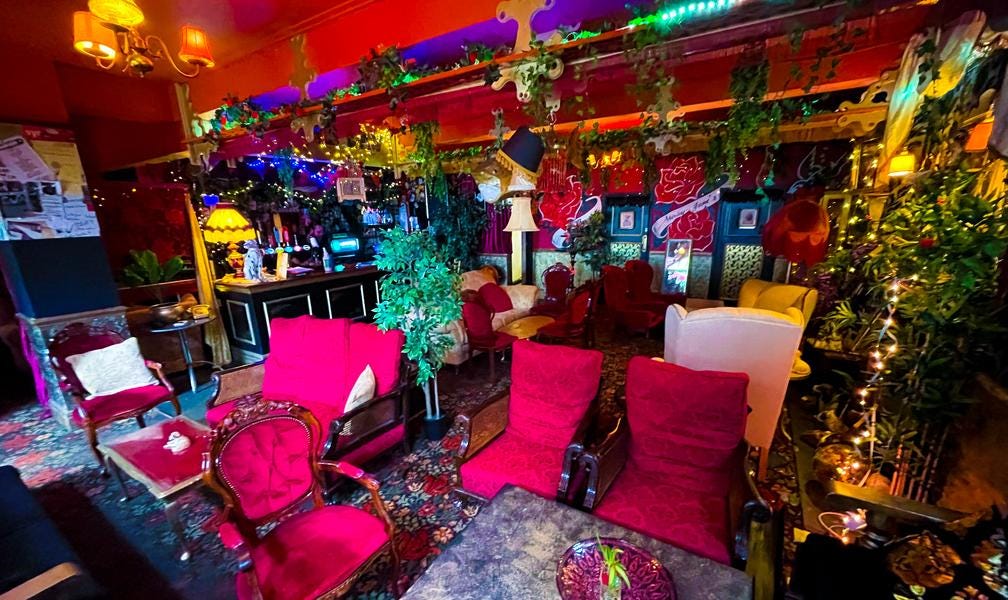Welcome to the third instalment in our ‘Before You Go’ series, where we invite someone we like and whose opinion we trust to pick one spot that they absolutely adore but that might be at greater risk at disappearing than it was a few years ago.
It might be a small family-owned restaurant, a backstreet pub, or a community garden… Any kind of place of which there are far fewer of these days. The idea is to go and visit the place with the person who nominated it and talk about what makes it so special: the people, the food, the drinks, the atmosphere, the decor and the history. In doing so, maybe we can tempt a few people to visit it for the first time or to go back and reacquaint themselves with an old favourite.
For this edition we're moving away from Soho and going south of the river to Little Portugal with the writer and lecturer Matthew Turner.
Here are the first two instalments of the series in case you missed them:
Estrela Bar on South Lambeth Road, with Matthew Turner
“It was a complete accident that I even lived in this area,” says Matthew Turner as we sit down at a table outside the Estrela Bar on the South Lambeth Road; a part of south London that Will Self once described as the ‘Stockwell-Vauxhall hinterland’ (a concept to which we’ll return later).
“I’d been living in Green Lanes, but I needed to find somewhere closer to Chelsea where I work,” he remembers. “So I was looking for a new flat but at the same time I was housesitting in Birmingham. One day, after realising I had fallen for a fake apartment and had lost all my money, I was in London and had to be in Chelsea the next day which meant I couldn’t go back to Birmingham. While I was working out what I was going to do, I just happened to meet an old friend on the bus and she offered to let me stay at her flat on the Wandsworth Road for the night.
“I remember approaching her place and I was fascinated by it, because there was this stretch of Portuguese bars and restaurants and then just this big, derelict piece of land with an overgrown play area. In the morning I walked outside and I thought ‘This area is quite cool’. It had wasteland, which wasn't for me a depressing sign of dereliction but more an optimistic sign that not everything had been developed, and MI6 was quite close by. Even though it was a place you would never really visit unless you lived there, it seemed like a weird coming together of all the things I was interested in.”
Proximity to wasteland and MI6 might not be on everyone’s list of property ‘must haves’, but if you know Turner’s work then it makes sense. As well as being a lecturer at Chelsea College of Arts, Turner is also the author of the novel Loom, which the book jacket describes as “a story about hidden wealth, identity, edges becoming centres and how our homes are a crowd of strangers.” Turner is also the sort of person who, when asked to write about his fantasy home for the FT, chooses the “purple 1974 Cadillac Eldorado convertible with leopard print interior” from True Romance.
“When I was in that flat for that one evening, I felt a bit out of place,” he says, “but in the morning I walked out on to the street and went for a coffee in one of those Portuguese places I’d passed the night before, and it just felt like I’d been transported somewhere else.”
A few months later, Turner found his own flat in Stockwell and stayed in the area for the next four years or so. During that time he also learned to love London again.
A south London portal to Porto
Like most people who move to London from somewhere else, Turner had initially been besotted by his adopted city. But, by 2016 he was approaching the end of his London honeymoon period.
“When I moved to Stockwell I was at that ‘I really hate this place’ point,” he says sipping on a Super Bock, “but this areas helped me out of that. I would walk to work through the back streets, down past Larkhall Park, then turn down Wilcox Road to O Fumeiro, another Portuguese place; where I would stop and have a coffee and then continue on to work. I always think of that time as being the turning point of going from really disliking a place to loving it again.
“Without an oven, or plates and cutlery in my new place I would stop at Estrela on the way back from work some nights, that was my ritual for the first few weeks. Getting by in London often means finding those small patches of relaxation and escape. I had forgotten that and found it again here. I always ordered the same thing and I still order the same thing now: wild Clams in white wine garlic sauce, deep fried battered white bait and king prawns ‘Estrela style’. With either Super Bock or a Vinho Verde.
“If I come here with friends we will have some drinks until it closes and go to Grelha D'Ouro Cafe-Bar for a game of pool in the basement, where we can be judged by the old Portuguese hustlers that keep a close eye on the games being played.”
Estrela Bar is just one of multiple cafes, bars and food shops that serve the 25,000 Portuguese speakers that live in the borough. The South Lambeth Road is a busy, noisy road, but the curious mix of exhaust fumes and engine noise mingling with the smell of petiscos (Portuguese tapas) and the sound of European football commentary, gives this slice of south west London an utterly unique charm.
“There was one restaurant on the Wandsworth Road that had astroturf outside,” Turner remembers, “so you could almost pretend you were in Porto or somewhere when you were sat there. But then you’d look up and you’d have the traffic roaring past you. I love that contrast. It almost feels like you're in two places at once.”
Cristiano and community
You don’t have to talk to Turner for long to realise that he has chosen Estrela as his beloved London space, not just because it feels like a slice of Lisbon transported into SW8, or because its menu contains a ‘Cristiano Ronaldo sandwich,’ but because it serves as a representation of the whole of Little Portugal. It’s an area and a community that Turner obviously still adores and that he’s rightly protective of.
“Will Self might have described it as a ‘hinterland’ but to most people who live here it’s not some in between place. There is a real sense of community here,” he says. “Obviously that’s centered around the thousands of Portuguese people who live here, but even if you’re an outsider you can still get something from it. I remember there was one conversation I had in a cafe when two women asked me which I preferred, Porto or Lisbon. I thought ‘Oh great, they’re trying to make friends’. Little did I know that it was a trick. One of them was from Porto and the other one was from Lisbon. I said Lisbon and the other woman never spoke to me again!”
It’s not only the pesticos bars and Portuguese cafes that give this area it’s character though. “Down the road you have the Cavendish Arms,” Turner says, “which I would say has one of the most unusual pub interiors I’ve ever seen. The whole of the inside is painted red and there are silver trinkets displayed everywhere. There's a shark hanging from the ceiling that’s got the head of the dog. It’s like it’s own little world because there are no windows, and there are only sofas to sit on so it’s like being in someone’s living room. That’s another of those places that doesn’t seem like it could ever succumb to all the things going on around it.”
Gentrification creep
Those ‘things going on around it’ are clear to see as you walk towards the South Lambeth Road from Vauxhall. That mysterious patch of wasteland that Turner was attracted to when he moved here is long gone of course. The transformation of Battersea and the arrival of the American Embassy in 2018 (not to mention the infamous sky pool) has utterly reshaped Nine Elms and created a blast radius of gentrification that is slowly creeping towards Little Portugal. Wilcox Road was effectively closed down in 2021, with multiple business being turfed out by “the meanest landlord in Britain” so the area could be ‘revamped’ (demolished to make way for luxury flats).
Keep reading with a 7-day free trial
Subscribe to London in Bits to keep reading this post and get 7 days of free access to the full post archives.







